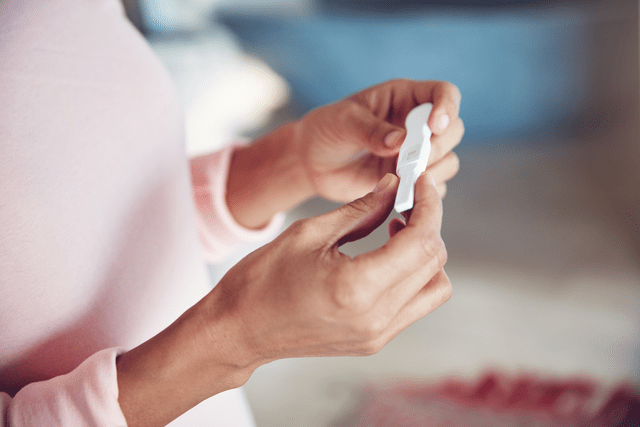When you’re trying to get pregnant, waiting each month for the first signs of pregnancy can be agonizing. You’re filled with expectations, analyzing every change with your body and wondering if it’s a sign of good things to come or a false alarm. Especially if it takes you a little while to conceive.
While 68 percent of women with no fertility issues conceive within three months, it can take up to 18 months to get pregnant. That’s a long time to look for those first signs of pregnancy. But if you know which signs are worth watching for, you can ease your anxieties over getting pregnant and about finding out if you’re expecting.
What are the early signs of pregnancy?
Most women keep a watchful eye on their period and know to look for a missed period. But there are several other early pregnancy symptoms that can signal a baby on the way. You can start experiencing these symptoms within the first week after conception.
7 Most Common Signs of Pregnancy
Every symptom can also be explained by another health issue. So, it’s hard to know early on whether you’re actually pregnant or just dealing with an unrelated problem. According to the American College of Obstetricians and Gynecologists’ book, Your Pregnancy and Childbirth, Month to Month, women notice these pregnancy symptoms most often:
1. Missed Period
A blip in your normal cycle is the first thing you’re likely to notice. If you’re pregnant, you’ll miss your next period entirely or it will be much lighter than normal. If your period is a week late or more, it may be a sign you’re pregnant - however, some women often have irregular periods. Other pregnancy symptoms don’t show up until a week or two after you’ve missed your period.
2. Nausea
Morning sickness is a well-known symptom of pregnancy, but it’s not exclusive to the a.m. You can feel nauseous at any time of day, with or without vomiting. Nausea typically shows up two weeks to two months after conception and can last for several weeks. It’s generally one of the first signs of pregnancy.
3. Frequent Urination
Nausea isn’t the only thing that will send you to the bathroom in the early weeks of pregnancy. You may find yourself there more often to urinate. The volume of blood in your body increases during pregnancy, which eventually leads to extra fluid in the bladder. This is one symptom of pregnancy that doesn’t fade after the first few weeks. As your baby grows, it puts more pressure on your bladder and increases your bathroom breaks.
4. Tender or Swollen Breasts
When you’re pregnant, your hormones go into overdrive to prepare your body for a baby. The increased hormones can make your breasts swollen or tender. Sore breasts are also, however, a common symptom of normal menstruation. When it’s a much more intense tenderness or swelling, it may be a sign of pregnancy that typically shows up within the first couple of weeks.
5. Fatigue
Fatigue is frequently a symptom of pregnancy and can last through the second trimester — and pop up again in the last few weeks before childbirth. Your changing hormones are again a contributing factor, causing you to feel sleepy or tired.
6. Mood Swings
Swings in your hormones lead to swings in your mood. You may notice yourself riding high one minute and feeling down the next. You may feel like you can’t control your emotions at all. Mood swings are a normal part of pregnancy, but it’s always a good idea to seek help or talk to your OB/GYN if you experience extended downswings or depression.
7. Bloating
You may already feel bloated every month before you get your period. Those same hormone changes cause bloating in early pregnancy. Your clothes may be fitting a bit tighter as your uterus expands during pregnancy.
Other Early Pregnancy Symptoms
Every woman is different. Every pregnancy is different. You might not experience the same things as your friends or as you did with a previous child. These less common symptoms aren’t as frequent but are still normal signs of pregnancy:
- Lower back pain – It’s no surprise that you’ll experience an aching back in the last few weeks of pregnancy, but many women also have backaches early on.
- Headaches – Hormone changes (again) and increased blood flow can make your head hurt — much like menstrual headaches.
- Changing tastes – Nausea and vomiting can dampen your appetite and make you averse to foods you once enjoyed. You may also feel hungrier more often, need to eat just to avoid feeling queasy or start craving new foods. This all can happen early on and at any other point of pregnancy.
- Darkened areolas – In addition to breast tenderness, you may notice their appearance changing. The area around your nipples gets darker when you’re expecting — the first of many breast changes you’ll experience throughout pregnancy.
When should I take a pregnancy test?
When you’re anticipating pregnancy each month, you’re quick to take a test at the first opportunity. But you have good reason to wait. Many home pregnancy tests advertise accuracy up to a day after conception. However, most brands can’t consistently detect a pregnancy that early. You’re more likely to end up with a false negative and dashed hopes.
The best time to take a pregnancy test is 12 days after ovulation. At this point, implantation has occurred and your chances for a false negative are much lower. You can test a few days earlier, but there’s more risk of getting an inaccurate result.
The choice is up to you. If you’ve missed your period and are experiencing some of the early symptoms, go ahead and take a pregnancy test. If you have a negative test and feel the same symptoms or show new signs of pregnancy, take another test after a week.
I found out I am pregnant - when should I visit my OB/GYN?
Once you have a positive pregnancy test, visit your OB/GYN for confirmation. Home pregnancy tests are nearly 97 percent accurate, unless you take one too early or incorrectly. Blood tests, on the other hand, are more sensitive than urine tests and give you a definitive yes or no.
“If you’re seeing signs of pregnancy, and you have missed your period, you should call your OB/GYN,” says Dr. Katelyn Buhrow, OB/GYN at the Iowa Clinic. “Your OB/GYN can provide everything from preconception counseling to help you get pregnant, to prenatal care, to pregnancy care and delivery. We’re here, and we’re honored to support you in your journey.”
Even if you had a negative urine test, but your body’s still sending pregnancy signals, you can visit your doctor for a definitive answer. Your OB/GYN will give you a blood test to check for pregnancy as well as a physical exam.
A physical exam will help set a baseline for your health so you and your doctor can better manage your health throughout pregnancy. You’ll also be able to set expectations and get on an appointment schedule to monitor you and your baby until the day you deliver.


